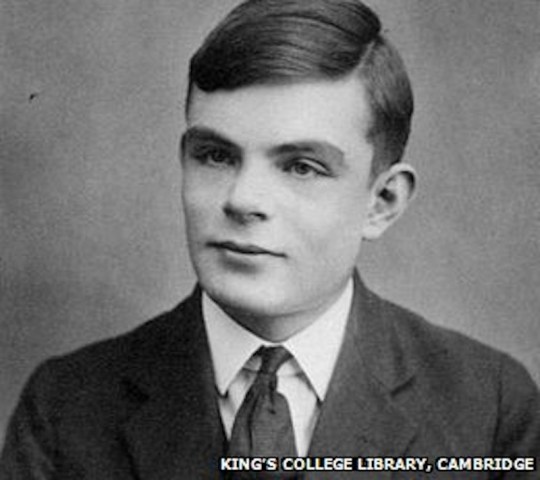Yes, Alan Turing Deserves a Pardon, But Not Because He Was a National Hero
Pardoning Alan Turing is a nice thought, but it runs the risk of sending the wrong message -- that thousands of other men who suffered his same fate in Britain deserved it.

There’s a new movement gaining steam in England to officially pardon British cryptographer and godfather of modern computer science Alan Turing, and it appears likely that this one will finally end in a formal pardon. Now, ordinarily, we’d be all for that, but for one fact. If Turing is issued an official pardon, it will be for the wrong reasons, and runs the risk of ignoring why he actually deserves an apology from his government — and why many other Britons who were similarly affected by a bad law deserve the same.
Turing, whose work at Bletchley Park in England helped break some of the most stubborn and complex Nazi codes of WWII, was tried in 1952 under a British “gross indecency” statute. He plead guilty to having a sexual relationship with another man. The relationship was consensual, and between two adults, and in the end, it resulted in Alan Turing being chemically castrated by the British government. His security clearance was revoked, and he was removed from his code breaking work with the British government. After two years of treatments with female hormones that left him impotent, Turing took his own life.
It’s an undeniable fact that Alan Turing was a hero to the British people and the free world whose work cracking the codes of Axis powers saved lives and helped the war effort. That’s one of many reasons Turing deserves the respect and plaudits of later generations. But it’s not why he is owed a pardon. He’s owed a pardon because the law he was tried under was a bad one, and the way his government treated him was monstrous. Turing’s chemical castration at the hands of the British courts — for the crime of having consensual sex with another man — was unconscionable regardless of who he was.
Previous ettempts to secure a pardon for Turing have met with little success, though in 2009, British Prime Minister Gordon Brown issued an official apology for the way Turing was treated. And while he acknowledged in that very statement that “many thousands of other gay men who were convicted as he was convicted under homophobic laws were treated terribly. Over the years millions more lived in fear of conviction,” the official apology was directed only at Turing. Where, then, is the apology that addresses those countless other ruined lives? We’re still waiting.
Don’t get me wrong — I want to see Alan Turing pardoned. But I want to see it for the right reasons. Chemically castrating a person for their sexuality isn’t wrong because that person was also a war hero with some name recognition. It’s wrong because it’s wrong. Granting Turing a pardon because he’s Turing, and not because the law was a bad and unfair one muddies the waters. It allows the government to pat itself on the back for doing the right thing where Turing is concerned, while issuing itself a pass for the fates of thousands of other men who were imprisoned under the “gross indecency” statute, or who lived under the constant threat of blackmail for over their actions because of the provisions of the law. (This practice became so common in the eight decades that the indecency statute was in place that it became commonly known as The Blackmailer’s Charter).
While an official pardon for Turing’s crime seems like a nice gesture, there’s an ugliness implicit in it. A pardon just for Turing implies that his crime — again, being a homosexual and nothing else — deserves to be overlooked because of his service to the state. In doing that, there’s a tacit implication that the legions of other gay men affected by the same law as Turing deserved their fates — that the law and the state treated them fairly. That the state was right in its jailing of citizens for the crime of being different, and that it owes no one a mea culpa over the matter. No one but Alan Turing, that is, and even then only after decades of petitions and campaigns by admirers of his work.
Back when the official apology was issued to Turing in 2009, then Prime Minister Gordon Brown closed on the following statement:
“So on behalf of the British government, and all those who live freely thanks to Alan’s work I am very proud to say: we’re sorry, you deserved so much better.”
That’s true. But Turing wasn’t the only one who deserved better by a long shot. And acknowledging that fact is more important than pardoning him alone.
(via The Guardian, Policy Mic image via Cambridge Libraries)
- Here’s Alan Turing’s hand-drawn Monopoly board
- And the official Alan Turing themed Monopoly board
- And some of his documents on code breaking, where he was largely unparalleled
Have a tip we should know? [email protected]